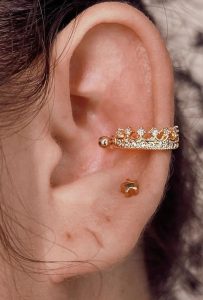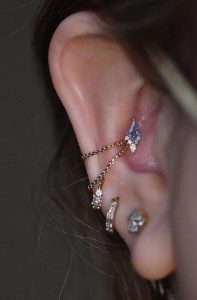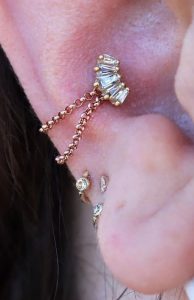Conch piercings are a stylish form of body adornment. Once you’ve gotten your conch pierced, proper aftercare is essential for a smooth healing process. This article will guide you through the steps on how to clean your conch piercing to ensure it heals properly and avoid complications.
Remember, aftercare instructions can vary depending on your piercer’s recommendations. Always follow the specific instructions provided by your professional piercer.
Understanding Aftercare
Aftercare is crucial for any piercing, and conch piercings are no exception. Here’s why aftercare is important:
Reduces Risk of Infection:
Cleaning your piercing regularly helps remove bacteria and debris that can lead to infection.
Promotes Healing:
Proper cleaning allows the piercing wound to heal properly and minimizes irritation.
Minimizes Discomfort:
Following aftercare instructions can help reduce swelling, redness, and discomfort during the healing process.
Conch Piercing Cleaning Supplies
Here’s what you’ll typically need to clean your conch piercing:
-
Sterile saline solution: This is a salt-water solution that’s gentle and effective for cleaning piercings. You can find it pre-made at most pharmacies or grocery stores.
-
Gauze pads or cotton swabs: Use sterile gauze pads or cotton swabs specifically for cleaning your piercing. Avoid using non-sterile cotton balls, as the fibers can irritate the piercing.
-
Warm water: Opt for clean, lukewarm water. Avoid using hot water, as it can irritate the piercing.
Cleaning Your Conch Piercing
Here’s a step-by-step guide on how to clean your conch piercing:
-
Wash your hands thoroughly: Wash your hands with antibacterial soap and warm water for at least 20 seconds before touching your piercing. This helps prevent transferring bacteria from your hands to the piercing.
-
Prepare the saline solution: If you’re using a pre-made saline solution, follow the instructions on the packaging. If you’re making your own, mix one-fourth teaspoon of non-iodized sea salt with one cup of warm water.
-
Soak the piercing: Soak a gauze pad or cotton swab in the saline solution. Gently hold it against your conch piercing for a few seconds to allow the solution to loosen any crust or debris.
-
Gently clean the piercing: Gently clean the front and back of the piercing with the soaked gauze pad or cotton swab. Avoid twisting or rotating the jewelry in the piercing during cleaning.
-
Rinse with warm water: Rinse the piercing with clean, warm water to remove any remaining saline solution.
-
Dry thoroughly: Pat the piercing dry with a clean paper towel or allow it to air dry completely. Moisture can trap bacteria and irritate the piercing.
Repeat this cleaning process 1-2 times a day for the first few months of healing. As your piercing heals, you may be able to reduce the cleaning frequency to once a day.
Additional Aftercare Tips
Here are some additional aftercare tips to keep in mind for your conch piercing:
-
Don’t touch your piercing excessively: Avoid touching or playing with your piercing throughout the day. This can irritate the piercing and slow down healing.
-
Avoid harsh soaps and shampoos: Avoid using harsh soaps, shampoos, or other products around your piercing. These can irritate the delicate skin around the piercing.
-
No swimming or pools: Avoid swimming in pools, lakes, or oceans during the healing process. These bodies of water can harbor bacteria that can lead to infection.
-
Maintain good hygiene: Maintain good overall hygiene by showering or bathing regularly. This helps keep the piercing clean and reduces the risk of infection.
-
Listen to your body: If you experience any unusual swelling, redness, or persistent pain, consult a doctor or professional piercer immediately.
Conch piercings can be a beautiful and unique way to adorn your ear. By following proper aftercare instructions, including regular cleaning with a sterile saline solution, you can ensure your conch piercing heals properly and avoid complications.
Remember, aftercare is crucial for a smooth healing process. If you have any questions or concerns, consult your piercer for personalized guidance.
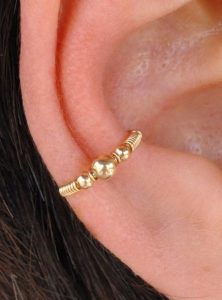
Avoiding Infection During Conch Piercing Healing
Conch piercings are a great way to express yourself, and proper aftercare is essential to prevent infection and ensure it heals smoothly. Here are some general aftercare tips to keep your conch piercing clean and healthy:
- Cleanliness is key: Wash your hands thoroughly with soap and warm water before touching your piercing. This helps prevent transferring bacteria from your hands to the piercing.
- Listen to your piercer: After getting your conch pierced, your piercer will provide specific aftercare instructions. These instructions may vary slightly, so it’s important to follow their guidance carefully.
- Gently does it: Avoid harsh soaps or rubbing alcohol on your piercing, as these can irritate the healing tissue.
- No swimming: Avoid swimming in pools, hot tubs, lakes, or oceans for several weeks after getting your piercing. These bodies of water can harbor bacteria that can increase your risk of infection.
If you’re concerned about cleaning your conch piercing or notice any signs of infection, consult a doctor or professional piercer. They can provide specific guidance on caring for your piercing and address any concerns you may have.
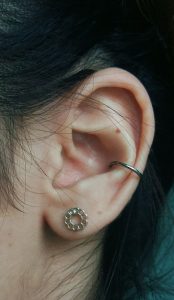
Healing Considerations for Conch Piercings
Conch piercings are a popular body modification, but like any piercing, they require proper care to heal correctly. Here are some general guidelines to keep in mind during the healing process:
-
Healing timeline: Conch piercings typically take 2 to 4 months for inner conch and 3 to 6 months for outer conch to heal completely. Be patient and consistent with aftercare during this time.
-
Listen to your body: Some discomfort and swelling are normal during the initial healing period. However, if you experience excessive pain, redness, or pus, consult a doctor or professional piercer.
-
Avoid harsh irritants: Keep the piercing away from harsh chemicals like hairspray, perfume, or makeup. These products can irritate the piercing and slow down healing.
-
Don’t sleep on it: Try to avoid sleeping directly on the new piercing for the first few weeks. This can irritate the piercing and prolong healing.
-
Consider using a travel pillow for additional support and to avoid putting pressure on the piercing while you sleep.
By following these general aftercare tips and the specific instructions provided by your piercer, you can help your conch piercing heal smoothly and minimize the risk of complications.

